Last updated 09.18.2025
Can I get dental implants if I have dentures?
Wearing dentures? Learn how dental implants may still be an option and what to expect during the transition.

Learn more about Dr. Carolina Cespedes

Can you get dental implants after wearing dentures?
If you wear dentures, you’re not alone. Millions of Americans rely on them to eat, speak, and smile with confidence. But over time, some denture wearers begin to wonder if there’s a more permanent solution. The good news? You can often replace dentures with dental implants even after many years of being without teeth.
Whether you’ve had dentures for five years or thirty, you may still qualify for dental implants. When deciding on implants it’s important to understand how your oral health has changed and what steps can help you move forward.
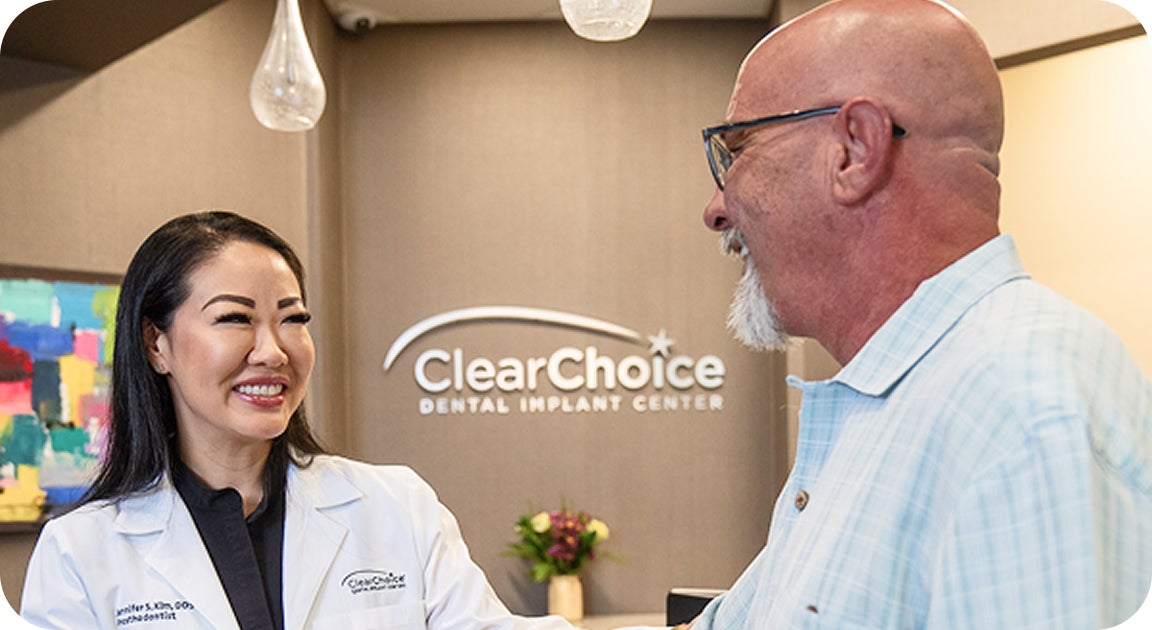
How long can you wear dentures before switching?
There’s no exact time limit. Many patients make the switch to dental implants after years or even decades of wearing dentures. That said, the longer you wear dentures, the more likely it is that some bone loss has occurred, which can affect implant planning.
However, long-term denture use doesn’t automatically mean you’re not eligible for dental implants. Technology today, combined with personalized treatment planning, makes it possible for almost everyone to leave removable dentures behind.
Does long-term denture use affect bone or implant eligibility?
It can, but it’s also something that can be managed. Over time, wearing dentures without stimulation from natural tooth roots can lead to jawbone shrinkage. This bone loss is a natural response to missing teeth and can affect how implants are placed.
If significant bone loss has occurred, your ClearChoice team may recommend bone grafting or other preparatory procedures to help rebuild the jaw structure before placing implants.
What type of implant is best for denture wearers?
Many denture wearers choose to move beyond removable dentures by exploring implant-based options that provide greater stability, comfort, and function. These solutions are ideal for individuals who have lost most or all their teeth and are seeking a more secure, long-term approach to tooth replacement.
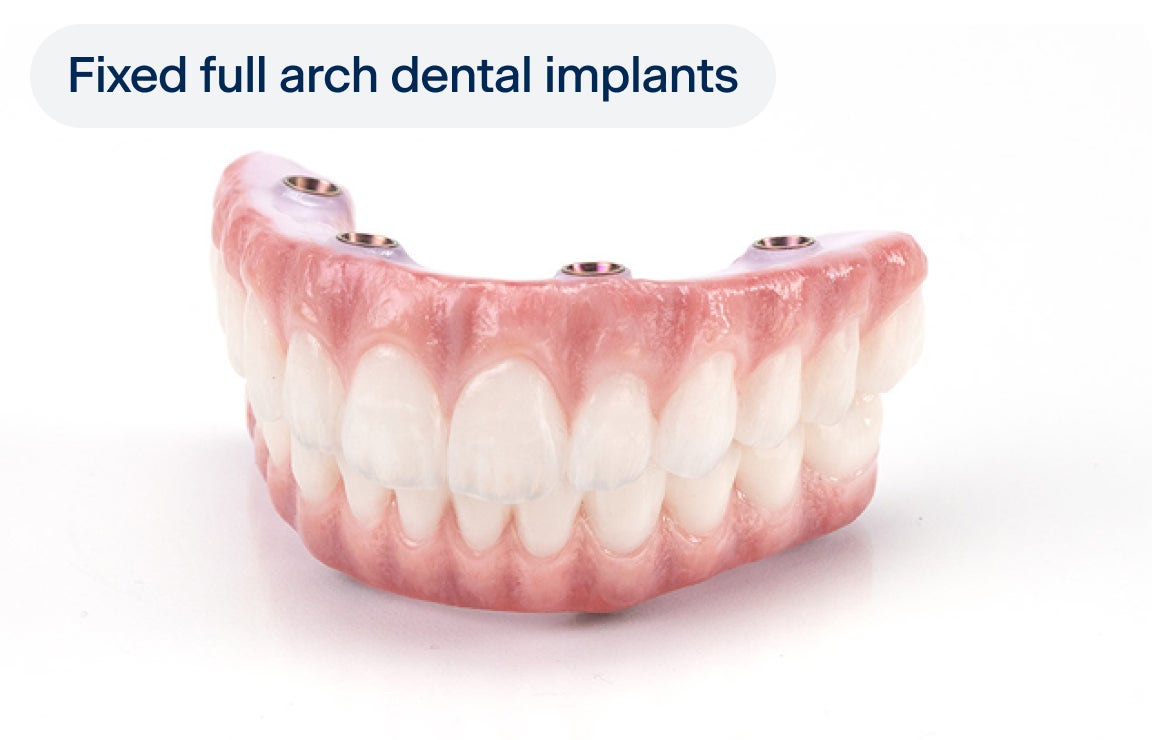
ClearChoice offers two implant-based prosthetic options:
Fixed full arch dental implants: This approach involves placing four or more implants in the jaw to support a full arch of teeth. The prosthesis is non-removable, does not rest on the gums, and functions much like natural teeth, offering exceptional stability and aesthetics.
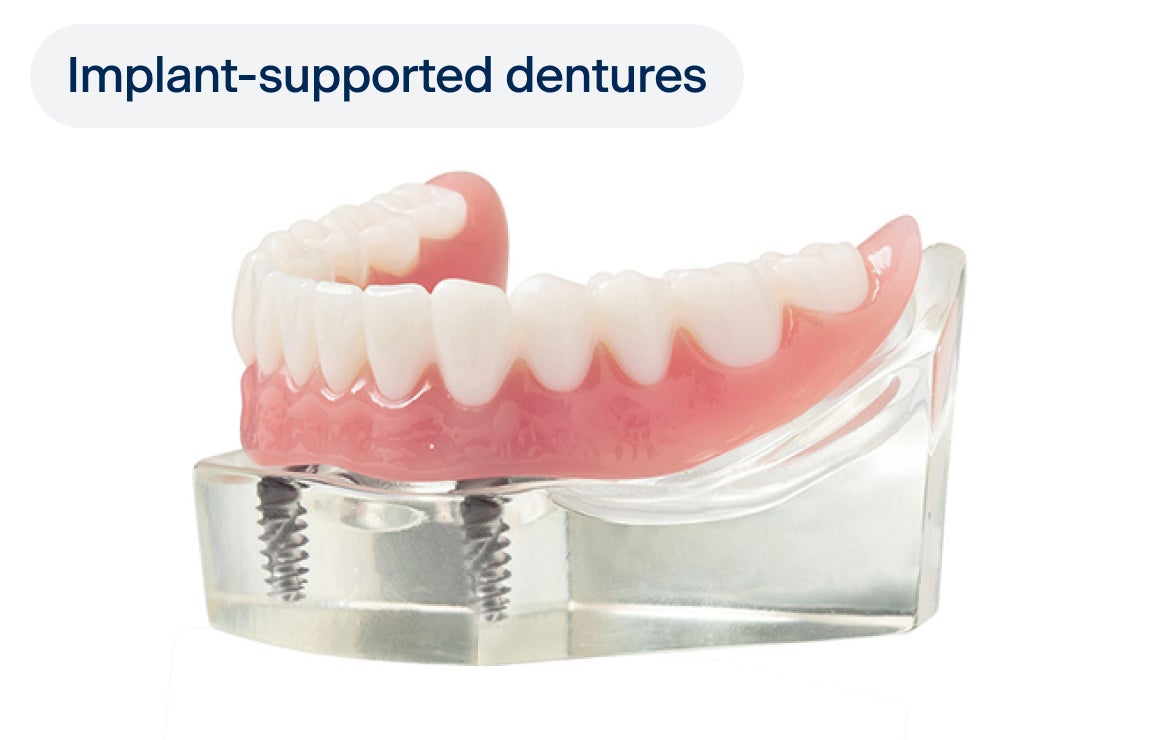
Implant-supported dentures: This option uses two or more implants to help stabilize a removable denture. The denture "snaps on" to the implants for improved security compared to traditional dentures, while still being removable by the patient. This can be a more affordable option, though it does not offer the same level of permanence or function as a fixed solution.
Your ClearChoice provider will help determine which option aligns best with your oral health and long-term goals.
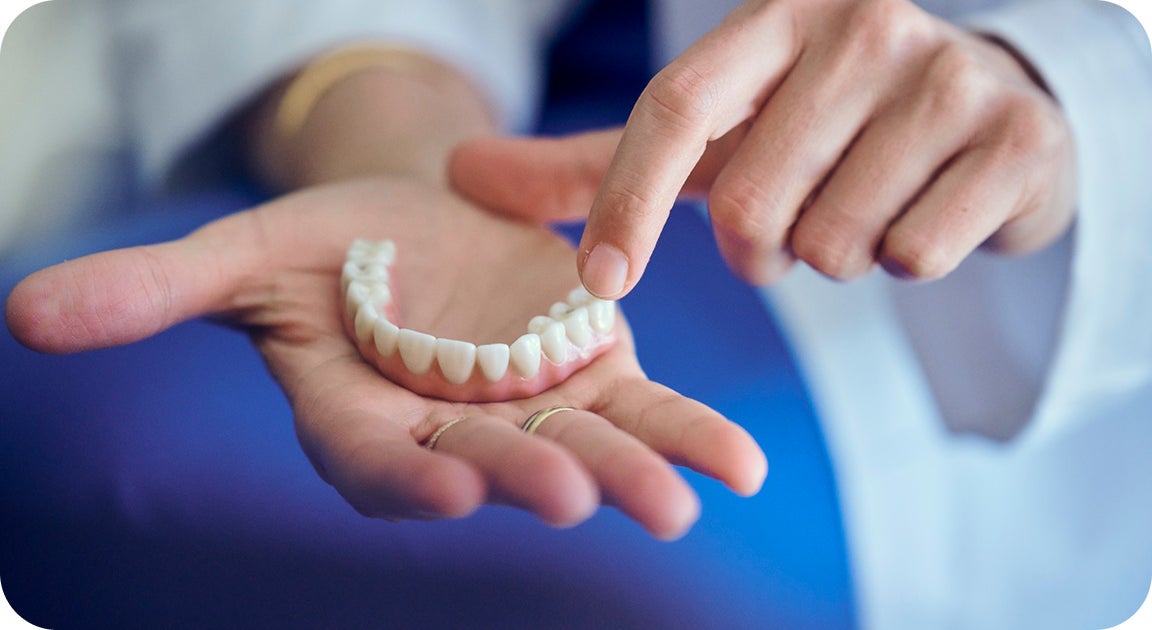
How to transition from dentures to dental implants?
Moving from dentures to implants is a process that begins with understanding your needs, your desires for a fixed or removable solution, and ends with a more confident, stable smile. The appointments and procedures are different for the fixed versus removable solution.
Can existing dentures be used as temporaries with an implant-supported denture treatment?
In some cases, yes. Existing dentures may be modified for temporary use while healing of the implants occurs. This option allows you to maintain aesthetics and function while your implants settle into place.
However, depending on your treatment plan, your care team may recommend new temporary teeth that are specifically designed to work with your implants. This ensures better fit, comfort, and long-term results.
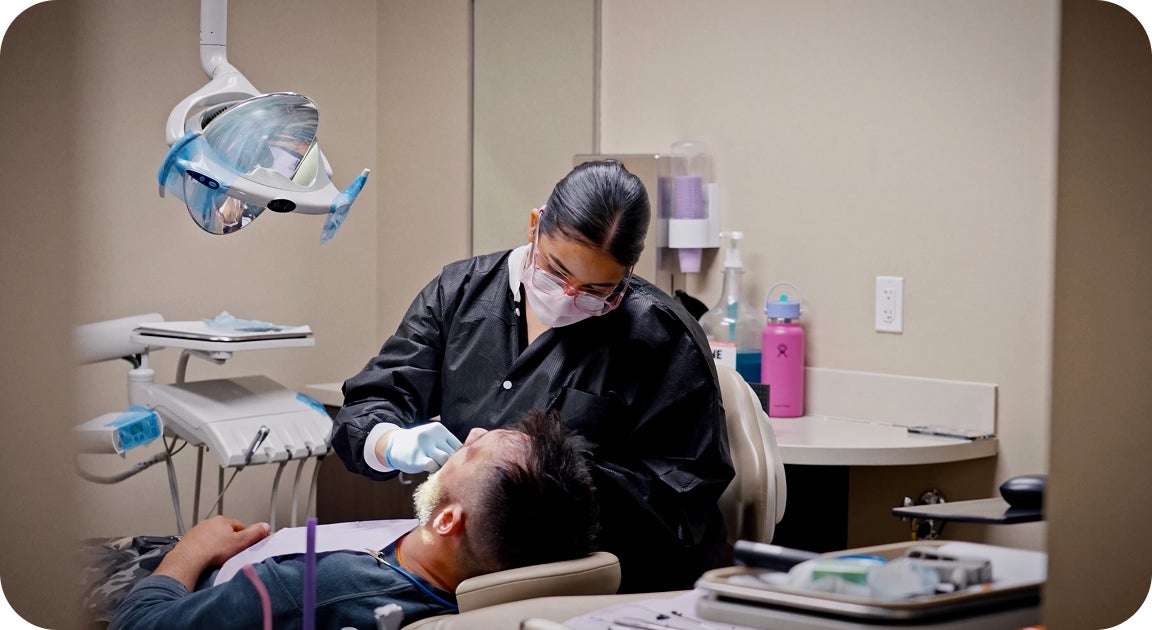
What’s the timeline for switching from dentures to dental implants?
The process and timeline can vary significantly depending on the type of implant solution you’re considering.
Considering a fixed full-arch solution?
Learn about how long it takes, whether you may qualify for immediate-load implants, and what to expect before, during, and after treatment.
Interested in implant-supported dentures?
Understand the steps involved in stabilizing a removable denture with implants, including healing time, restoration options, and what makes this a more secure alternative to traditional dentures.
Do dental implants feel better than dentures?
Many patients ask this question, and the answer depends on the type of implant solution used. For those who choose a fixed full-arch solution, the experience often feels much closer to natural teeth offering greater comfort, stability, and confidence when eating or speaking.
Patients with implant-supported dentures typically report better function and retention compared to traditional dentures, though the appliance is still removable and rests on the gums.
Your ClearChoice team will help you understand the differences and guide you toward the option that best fits your lifestyle and goals.

Comfort and stability differences
Unlike dentures that can shift or loosen over time, dental implants are anchored directly to the jawbone. That means:
No adhesives or pastes
No slipping or clicking during speech or eating
A more natural feeling bite
Many patients say they forget their implants are even there, which is harder to achieve via traditional dentures.

Maintenance and durability comparisons
Dental implants offer long-term durability, but care routines differ depending on the type of prosthesis.
Fixed Full-Arch Solutions: These non-removable teeth are securely attached to 4 or more implants. Patients care for them much like natural teeth through daily brushing, flossing, and the use of tools like water flossers or interdental brushes. No soaking, no removal, and no adhesives are required.
No overnight soaking
No relining appointments
Less long-term wear and tear compared to dentures
Implant-Supported Dentures (Overdentures): These removable dentures snap onto 2 or more implants for added stability. While more secure than traditional dentures, they must still be removed daily for thorough cleaning. The implants and attachments also require ongoing care to maintain long-term success.
Regardless of which option you choose, your ClearChoice team will provide a personalized maintenance plan and help you understand how to care for your new smile at home and through routine checkups.
Are implants worth the upgrade from dentures?
Dental implants involve a higher upfront investment, but they often deliver long-term value through improved function, fewer replacements, and enhanced quality of life. For those who want a solution that feels more like natural teeth, implants are often a worthwhile transition.
Are you eligible for implants if you have dentures?
Every person’s situation is unique, but many denture wearers are pleasantly surprised to learn that they still qualify for dental implants even after years of tooth loss.
Who may not be eligible after denture use?
Health challenges don’t always mean you’re ineligible. ClearChoice clinicians evaluate your health history, oral condition, and personal goals before making a recommendation.
Can you still qualify if you’ve been missing teeth for years?
Yes, even if you’ve worn dentures for decades, it may still be possible to qualify for dental implants. Many patients who assumed they’d “waited too long” are able to move forward with the right support.
How bone grafting can help restore eligibility
Very rarely, if bone has resorbed over time, bone grafting may help build a stable foundation for implants. Grafting involves adding material to areas of the jaw where bone is too thin or soft, often using advanced techniques to encourage natural regrowth.
Though this may extend your treatment timeline, it opens the door to lasting implant solutions and a stronger bite foundation.
Ready to explore life beyond dentures?
At ClearChoice, we help denture wearers transition to implant-supported solutions through personalized care, in-house specialists, and coordinated treatment under one roof.
Schedule a consultation today and take the next step toward a smile that feels like yours again; no adhesives, no slipping, just confidence.

Getting dental implants with dentures FAQs
Can I get dental implants if I already have dentures?
Yes. Many patients successfully transition from dentures to implants, even if they’ve had their dentures for many years. An evaluation can determine whether you’re eligible and what options fit your needs.
What is the process of switching from dentures to implants?
The process begins with a clinical evaluation followed by implant placement and healing. Once your implants have fully integrated with the bone, your custom final teeth are placed for long-term function and comfort.
Are implants better than dentures for comfort and function?
Implants are typically more stable, more natural-feeling, and easier to maintain over time. They don’t slip or require adhesive and can improve speech, chewing, and daily comfort.
Do I need a bone graft if I’ve worn dentures for many years?
Not always. Some patients maintain enough bone to proceed with implants right away. Others may benefit from grafting to build a stronger foundation. Your ClearChoice team will walk you through what’s best for your case.



